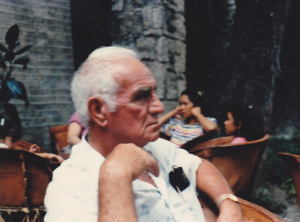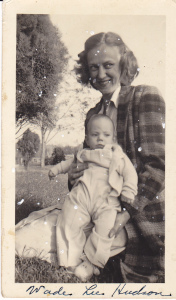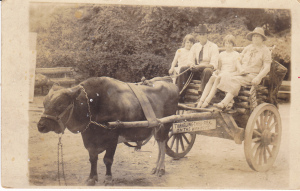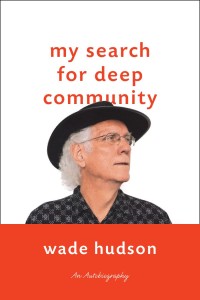First grade was a horror. Growing up, except for occasional visits by my two cousins, my only playmate was my older sister. We had no kindergarten or pre-school, so my social skills were underdeveloped. My school, Landmark, included all twelve grades and I was not prepared to encounter unruly, often violent, teenagers, who scared the hell out of me. During recess, I felt as if I’d been thrown into a jungle with very large animals that might attack at any moment.
When we moved to Dallas, other kids made fun of me because of my Arkansas accent. That made me feel even more out of place. Eventually I learned to talk like a Texan.
I continued to wet the bed often, which embarrassed me, especially when my cousins visited. And I had a low threshold for pain. Throughout my childhood, I would often faint when I bumped my elbow or knee against something hard. As I later learned, that was probably because, to minimize intense emotions, neck muscles around the hypothalamus tighten, which cuts off blood flow to the brain – as with the stereotype of a woman fainting upon seeing a mouse.
School was a snap for me. I was always a “teacher’s pet,” well-behaved and a quick learner. Mother later related a comment by one of my teachers that her students were harder to control when I was absent because I set a good example. My second-grade teacher, who read a Psalm at the beginning of each class, gave me a copy of a book of her poetry, which I treasured.
I did make one mistake, however. Someone stepped into our classroom and asked if anyone wanted to do something (I don’t remember the specifics). Since I always tried to answer first, I blurted out, “No.” The visitor confronted me, “How do you know that?” I knew instantly what he meant (some other student might have answered Yes) and felt embarrassed.
One of my classes helped us buy paperback books. I got Call of the Wild by Jack London and The Last of the Mohicans by James Fennimore Cooper and loved them both. My working-class schools were not very demanding, and I got very good grades without spending much time on homework.
One day, though, a teacher asked me to repeat what she had just said and I was unable to do it. I was shocked, because I thought I had been listening. I quickly stopped daydreaming so much.
I can’t remember ever enjoying art class. In drawing, my subjects were very limited. They included stick-figure cowboys having shoot-outs in town; battleships being attacked by airplanes; and a scene depicting two facing waterfalls, each with cascades of blue water flowing down and filling up one nook after another. It seemed I was the only student with so little artistic talent.
Once the teacher asked several boys to stand in front of the class. Some of us held our hands clasped in front of us, over our genitals. The teacher ridiculed us. “Why are you holding your hands there?” she asked, and told us to stand up straight with our hands to the side. It’s possible she was merely teaching us good posture, but the sexual reference seemed obvious and I was embarrassed.
Boude Storey Junior High School was worse than grade school. I enjoyed singing in the choir and got good grades. But, being very self-conscious, I was painfully uncomfortable during gym class. I’d never seen naked bodies before, and no one outside my family had ever seen me without my clothes on.
At home at night, we watched I Love Lucy, The $64,000 Question, Alfred Hitchcock Presents, and my favorite, Gunsmoke. But getting my family to stop talking and watch dramas was difficult. I’d say, “Why are we watching if you don’t want to watch?” They’d be quiet for a while and then start up again.
In 1957, the Soviet Union jumped ahead in the “space race” by launching Sputnik, the first satellite to orbit Earth. That scared the nation and led to more talk about the risk of nuclear war. In school, we took our “duck and cover” air-raid drills more seriously. Without notice, the fire alarm would go off and everyone had to get under their desk, holding their hands over their heads for protection from the nuclear blast!
At home, I discovered something interesting. I learned that, with practice, I could influence the result when I would hold a coin vertical on a table and flick it with a finger, causing it to spin until it falls down with either heads or tails on top. My secret discovery was that if you tilt the coin either forward or back before you flick it, the uppermost side is more likely to end up on top. At school, I’d compete with others to predict the outcome. We didn’t play for money, but I liked winning.
Football was of course the most popular sport at school. After all, it was Texas. I enjoyed playing touch football and flag football during gym class and after school, and performed fairly well. But I had no interest in playing on the school team. To my taste, the game was too violent. Besides, Mother would’ve been afraid that I might get hurt and would never have allowed it.
When I was fourteen or so, my best friend, David Skoog, bought some boxing gloves. We went into his garage, took off our shirts, put on the gloves, and started to box. After less than a minute, he hit me in the solar plexus and I doubled over in pain, out of breath. That was the end of boxing for me. Then David taught me how to play chess. We played a lot and I quickly got the best of him.
At about that time, the movie “Blackboard Jungle” blew my mind with its great sound track, passion, and realism. To someone attending an all-white suburban school, it revealed a whole other world.
In gym class in the school I attended, we sometimes danced the two-step with the girls. I didn’t care for it.
Another school friend was Tommy Gramly. His father, who delivered mail, used to play semi-pro ball and was a very good Little League coach. His older brother, Jerry, made it to the minors. Tommy and I played golf at the public course and joined a bowling league. I was fairly good at those sports, and at basketball, too, but I didn’t stand out.
In 1958 “The Naked City” was my favorite TV show. It seemed so real, and it was intense. “There are a million stories in the naked city. This has been one of them.” I also liked “Peter Gunn” and its cool jazz. Like most people, we watched lots of Westerns, like “Have Gun, Will Travel,” “The Rifleman,” “Maverick,” and “Wyatt Earp.”
Mother bought us a small organ. She played it a bit, as did Sally. I played some, but never got into it.
Toward the end of the ninth grade, during lunch, I heard another student, George Littell, arguing that God does not exist, an idea that was completely foreign to me. But the argument intrigued me, so I asked my friend Larry Macon, “Who is that guy?” Larry said, “Oh, he’s my next-door neighbor. He’s a nice guy. I’ll introduce you to him.”
George and I quickly became good friends. I taught him how to play chess and he took me for my first visit to the public library. He introduced me to H.L. Mencken, his favorite author, and turned me loose in the section with books on philosophy and politics. I felt like a kid set free in an enormous candy store. The first books I checked out were essays by Bertrand Russell, including “Why I’m Not a Christian.” My life was forever altered.
South Oak Cliff High School was even worse than junior high. Dallas was dominated by the precursor to the Tea Party, the John Birch Society (which was also funded by the Koch family). The whole city was filled with John Birch Society billboards, and tons of cars sported John Birch bumper stickers. I hated this oppressive, radical orthodoxy and my teachers knew it.
In high school, George and I met three other students who shared our interest in “free thinking” – Ronnie, Mike, and Terry. On weekends, we’d stay up late smoking pipes and cigars, playing poker, and discussing life and philosophy (though we never drank and knew nothing about drugs). We commiserated with one other, reassured ourselves concerning our wisdom, and looked down on most everyone else (I did anyway). Two girls, Charla and Pam, seemed comfortable with our unconventional ways and were affiliated with our circle. (Later they married Mike and Ronnie.)
I started a Chess Club and set up a “ladder” on which each winner would move up a rung to determine his next opponent. My first organizing. George and I played after school almost every day. Soon he got to be a bit better than I was. But he and I both were usually at or near the top of the ladder.
Most of my teachers weren’t interested in the alternative worldview that George and I shared with our friends. I agreed with Mencken’s assessment that most people are “boobs,” members of the “booboisie.” For me, that characterization also applied to my teachers. As far as I was concerned, I was smarter than most of them.
During the first class of the day, “homeroom,” we were often forced to go to pep rallies. As I mentioned earlier, I protested by sitting down during “fight song” and got away with it. But my friend Gary Bishop didn’t fare so well. Gary belonged to another small group of quiet rebels, who raced sports cars in the parking lot of a local shopping mall and listened to jazz. I became friends with Gary, who’s now an accomplished photographer. (After graduating from high school he finished second among Texas amateur racecar drivers and once drove at Daytona.) I’d go over to his house and help him with his homework. Gary would also sit down during the fight song. But being close to the stage he was visible to the principal, who one day admonished him in front of the entire student body.
Gary lived on the “other side of the tracks,” in what was probably only a middle-class house, but it seemed like a mansion to me. I lived in a tiny house, the first house my parents ever owned, without my own bedroom and with six other people, including my two sisters and my mother’s parents. (After I graduated, the student body at my high school became almost totally African-American and Hispanic, and my neighborhood turned into an African-American ghetto with a house church on almost every block.) Gary also had the advantage of living with a family that, unlike mine, seemed to actually like one another. I enjoyed going to his house.
Gary turned me on to jazz and Joan Baez. That opened up a whole new world for me, which I loved. At home we only listened to Frankie Lane, Johnny Cash, Johnny Mathis and the like.
Gary and his friends were influenced by the Beats. My friends and I were, too, though perhaps in a less meaningful way. Pretty much everything I knew about the Beats came from watching “The Many Loves of Dobie Gillis” on TV, listening to the comedian Dave Gardner, and reading Hugh Hefner’s “Playboy Philosophy.” But I felt an affinity for their lifestyle, and, in one display of solidarity, wore my bathroom slippers, Native American-style moccasins, to school instead of regular shoes. I’d already concluded that there must surely be more to life than the drab conformity captured in the 1956 movie, Man in the Grey Flannel Suit.
I challenged school rules that seemed arbitrary, like having to leave the cafeteria during lunch hour and not being able to cross an invisible line when we went outside. Once I tried to organize an insurrection, but found little interest among my fellow students.
My sophomore year in Speech class I gave two speeches. The first was on “Why I Believe in Flying Saucers” (my mother’s influence). The second, inspired by a C. Wright Mills book that I had read before the United States drove Cuba into the arms of the Soviet Union, was on “Why I Like Fidel Castro.” I’m sure word of that strange affinity circulated among the teachers.
On the first day of my junior-year English Literature class, the teacher told us to read the introduction to our textbook and write a composition of at least three-fourths of a page, right then in class, about what we would have liked to do if we had lived in Medieval England. I read the introduction and quickly wrote the required minimum, which amounted essentially to a declaration that there was absolutely nothing I could imagine doing in Medieval England. With that, I put down my pen, probably with a smirk on my face. The teacher said, “Are you already finished, Mr. Hudson?” I said, “Yes.” She replied, “Well, I can see what kind of a grade you’re going to get.”
Later that year, she gave me a poor grade for spelling “there” incorrectly. When I complained about it with tears in my eyes, she said, “Well, in college if you do that, they’ll fail you.” I did in fact get my worst grade ever in her class, a “C.”
In 1960 I saw Elmer Gantry and was amused and intrigued by its lampooning of Christian evangelism. One day, curious, I went by myself to a tent revival. But at the door, the passion inside frightened me and I left.
I missed the early Marlon Brando and James Dean movies, since my father didn’t show them at his theater in the mid-1950s. But once I could drive, I started going to movies by myself. I was captivated by The Hustler and turned on immensely by La Dolce Vita, especially the living-room strip-tease scene.
Normally, I’d do my homework at my desk while waiting for class to start. The instructor of the anti-Communism course clearly hated it when I scored 100 on his history tests. Math was particularly easy for me, and on the Preliminary Scholastic Aptitude Test (PSAT), I answered every question correctly and scored in the top 1%.
Still, my high school never assigned me to any honors courses, not even math, probably because they didn’t like my demeanor. I assume my parents or I could have requested that I be placed in an honors class. But I knew nothing about them, including any advantages they might provide. Anyway, I hated the whole high school scene and was content to just go through the motions. I even rushed through my SAT tests, not knowing their importance.
My cavalier attitude toward my education quickly brought some chickens home to roost. When I went to Cal planning to major in Physics, I was surprised to learn that I couldn’t take the normal introductory Physics course, because I hadn’t studied calculus in high school. That setback disappointed me at the time, though on reflection, I now see it may have been a stroke of good luck.
Throughout high school I was only assigned to write one essay – yes, only one. I wrote mine on Voltaire, the French satirist.
The few teachers who supported my independent thinking had to be secretive about it, like the young female math teacher who quietly confided in me that she was reading Anna Karenina. The chemistry teacher would play chess with me in his lab when I skipped mandatory pep rallies. And the civics teacher was not shocked when a fellow student told the whole class that I had sat down during the Pledge of Allegiance at a public event. That had occurred at the city auditorium, where Ronald Reagan was making another stop in the General Electric-sponsored speaking tour that catapulted him to national political prominence. (I did not reject the Pledge of Allegiance per se, but only the oppressive way it was being used.) Besides my math, chemistry, and civics teachers, however, I found all of my teachers oppressive.
I’ve also surmised that the civics teacher may have been sympathetic to nonconformists because he was gay. He took some of us male students to Austin for the state basketball playoffs and carried on noisily with some of the students behind closed doors in ways that puzzled me.
After I had begun my habit of taking long walks during the evening, I read a Ray Bradbury science-fiction short story in a school textbook. It was set in the future and featured a man who would walk alone at night and look through the windows of homes he passed. In house after house, he noted the glaring light from the televisions inside, where people sat passive and transfixed. An automated, driver-less police car then drove up to the man, interrogated him, and arrested him for improper conduct. As I walked the streets alone at night, I felt like the character in the story must have felt, scandalous and something of a freak.
The only other piece I liked in that textbook was “The Wasteland,” by T.S. Eliot. It sounded like Dallas to me!
George once suggested that we run away from home. I was tempted, but decided against it. He did it anyway, but on the first night he called his mother from the edge of town and asked her to come get him.
Later, George was selected as Boy of the Month by the Dallas Optimist Club (his mother had nominated him). It seemed to me that he went downhill from there, perhaps as a result of glimpsing “success.” He even joined the JROTC (Junior Reserve Officer Training Corps), which struck me as strange.
After graduation, George and I corresponded some. (In one letter, he told me I should become an op-ed columnist.) Then one night at Ronnie’s house during Christmas break, we had a heated disagreement about the Vietnam war (George approved of it) and we never communicated again. Later, I heard he was working for Mobil Oil in Houston and that he had his sights set on eventually becoming CEO of one of the nation’s ten largest corporations. For all I know, he may have succeeded. He was a bit smarter than I was in terms of analytical intelligence – though I did beat him once in a citywide “numbers’ sense” contest, after I secretly prepped for it.
When it came time to apply to college, all of us had to go to the school counselor to get her recommendation. Terry said that when he went in, she asked him, “Is it true that George is an atheist?” Terry lied through his teeth and said no.
When I went in to see the counselor, my preference was to go to Rice University in Houston to study physics. She started to check the “highest recommendation” box, but then noticed that the faculty had not selected me for the National Junior Honor Society. She asked my why, and I told her I didn’t know, whereupon she left the office. After several minutes, she came back and checked the box for second-highest recommendation. I assume she had found out that I had some “character” issues. Rice rejected my application.
I didn’t go to the high school graduation ceremony, or to the prom. To my mind, the sooner I had nothing more to do with South Oak Cliff High School, the better (though for many years afterward I did think about going back and showing them how a good teacher operates).
That summer, in addition to going to some coffee houses to listen to folk music and to the Unitarian Church to check it out, I participated in a marvelous study group conducted by two students from the Perkins School of Theology. Our class valedictorian went to the same church as the seminarians who suggested the study group and she invited our little clique to participate.
We read stuff like Plato, Freud, Marx, and, most memorably, “Coney Island of the Mind” by the Beat poet Lawrence Ferlinghetti. I had never encountered any of that kind of material in high school, so it was a stimulating summer. After the last gathering, the hosts served us mint juleps, the first alcohol I had ever drunk. What a fitting sendoff to college!
That adventure with alcohol prompted some of us to get some six-packs and find a dark field where we could drink. Unfortunately, small round prickly balls got stuck on the bottom of my pants legs. When I got home Mother noticed and I got into big trouble. I didn’t care. I was about to be free.





